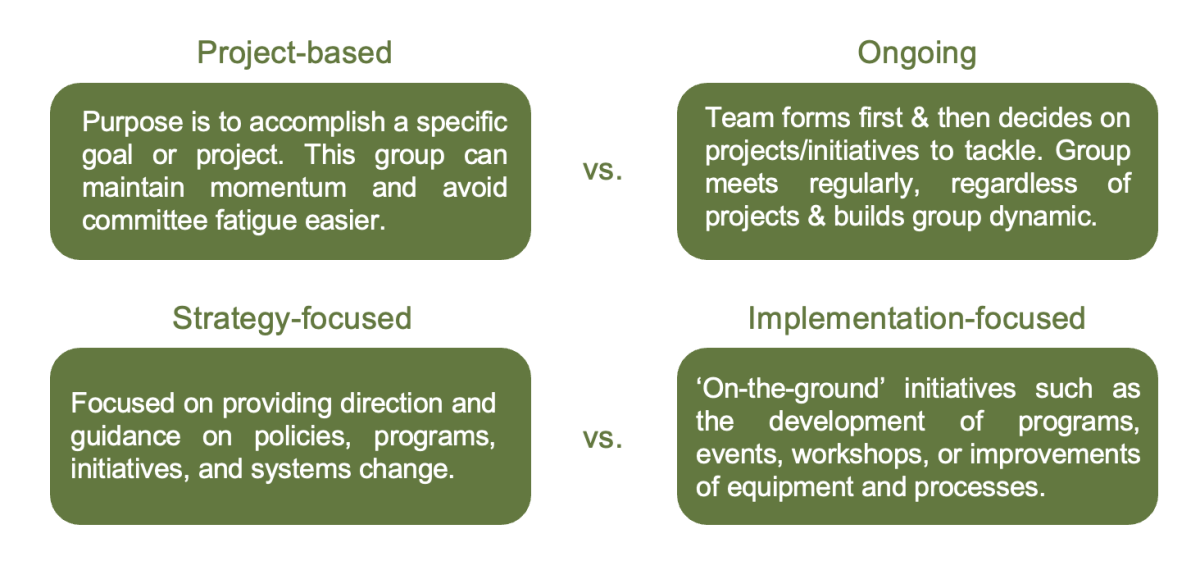This guide is designed to support you to form a sustainability committee or green team at UBC.
Throughout this guide the term ‘green team’ is used to refer to a unit, building or departmental team dedicated to climate action or sustainability, though these teams may take a variety of different names.
Conduct a Needs Assessment
Consider asking yourself the following questions before starting to help make sure you develop a team and process that fits with the needs of your workplace and the interests of your colleagues:
-
What is motivating us to start a green team? Why now?
-
What is our vision for a successful green team? One year from now, what will success look like?
-
Who will be involved?
-
What projects or changes will the team have completed? What projects will have started?
-
What impact will the green team have had on the workplace?
-
Whose support do I/we need to help ensure a successful green team?
-
Have we checked in to make sure that our unit, building or department does not already have a green team?
Determine the Right Team Type
Green teams or sustainability committees can be created dedicated to your unit, building, department or lab, depending on your specific workspace and goals for the team. They can be created for several different reasons and can take a variety of different forms. Here are some distinctions to consider, though your team may be a mix of the below:

Representatives from various green teams or sustainability committees across campus also periodically come together to share information and support each other in an informal ‘Committee of Committees.’ Check the sustainability directory for the most up-to-date information on this group.
Gain Leadership Support
Ideally, you will have an opportunity to speak to your leadership team and ask for support to set up your green team. You may choose to start with this step. Or you may choose to informally gather potential green team members together, and then present a request, with specific details, to senior leaders and managers. Order the steps based on the needs and culture of your workplace. Green teams are more likely to succeed when they are endorsed by leaders and if staff are given permission to use work time to attend meetings and run initiatives.
Tips for communicating with leadership:
-
It is helpful to have an initial idea of expected time commitments and possible activities, so managers and senior leaders understand what they are being asked to support. (This can be adjusted and communicated back to management once the team meets and outlines a specific scope.)
-
Identify how the green team’s work aligns with UBC’s strategic priorities.
-
Be prepared to have a specific request for actions they can take if they are supportive of the initiative, such as sending out a recruitment email to their staff or attending a kick-off lunch and learn.
Recruit Members
It is important that those on your green team want to be there! The best people for your team are staff members, faculty or students who want to participate, have an interest in sustainability, are comfortable taking a leadership role in their workplace and have permission from their supervisors.
Promote the Team
You may choose to use one or all three promotion methods below. This will depend on who you have already recruited and the nature of your workplace.
-
Brochures, posters and/or promotion emails can be great first steps. Be sure to use the most effective communications channels in your workplace. To inspire potential members, you may share some initial goals.
-
Ask your leadership team or managers to help identify potentially interested members and promote the benefits of participation.
-
Look for opportunities to meet with potential recruits face-to-face and make direct personal appeals to join the team. For example, you could host a lunchtime event to generate ideas for actions to green the workplace, and use this as a launching point for recruitment.
Create a Terms of Reference
Consider developing a Terms of Reference to help focus the group and establish a shared set of expectations around the scope and roles of the team. This tool provides guidance to support creation of an effective Terms of Reference document.

- UBC's Sustainability Strategy
- UBC's Climate Action Plan
- UBC's strategic priorities
List your Team on the Sustainability Directory
Once created, submit your team or committee to be included in our sustainability directory. This tool can be a great way to find and connect with other individuals and teams across campus passionate about climate action and connect with other teams. Contact scprogram.assistant@ubc.ca with your team’s name, a brief description of the team and a key contact to get your team added to the directory.
